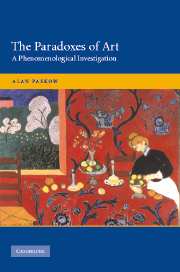1 - The Reality of Fictional Beings
Published online by Cambridge University Press: 27 March 2010
Summary
Let us begin again. I wish to re-pose certain questions about the nature of our most basic relationship to the depictions in artworks.
Who, then, or what are the fictional beings of artistic representation? Are they merely make-believe creatures who exist only in the minds of artists and the appreciators of artworks? If this is so, if we know them to be simply fantasies without any objective claim on us as real beings, then how can we possibly care about them in any way whatsoever? After all, we know that King Lear did not really act precipitously when he decided to divide up his kingdom; in fact, he did not act (in the real world) at all; furthermore, he and most of the personages in Shakespeare's play never existed and never will exist. So why do we grieve over Cordelia's death (or if not hers, then that of any other fictional character who has meant something to us)?
How we are to understand properly beings who ostensibly do not exist – the question of the ontological status of fictional beings of all types (e.g., Zeus, the lost continent of Atlantis) – is an old problem in Western philosophy, one already identified in Plato's work. So are the related, subordinate problems of the proper ontological location of fictional beings of artistic representation as well as the correct explanation of the nature of our involvement with them, mysteries that Plato poses in Book X of the Republic.
- Type
- Chapter
- Information
- The Paradoxes of ArtA Phenomenological Investigation, pp. 40 - 82Publisher: Cambridge University PressPrint publication year: 2004



